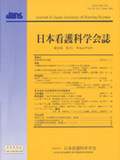Japanese
English
- 販売していません
- Abstract 文献概要
- 参考文献 Reference
- サイト内被引用 Cited by
要旨
目的:本研究の目的は,終末期がん患者とその家族に対する看護師のケアを評価するための看取りケア尺度を開発し,その信頼性と妥当性を検討することである.
方法:自由記述調査から得られたデータと文献検討に基づき,看取りケア尺度原案を作成した.内容妥当性の検討から尺度原案を修正し,49項目の看取りケア尺度原案修正版を作成した.4施設の看護師562名を対象とする質問紙調査を実施し,尺度の信頼性と妥当性を検討した.
結果:主因子法-プロマックス回転による探索的因子分析の結果,22項目5因子が抽出され,第Ⅰ因子から順に,【悔いのない死へのケア】【癒しと魂のケア】【苦痛緩和ケアの保証】【情報提供と意思決定のケア】【有効なケアの調整】と命名された.また,共分散構造分析による検証的因子分析を実施した結果,探索的因子分析で得られた仮説モデルの適合度が確認された.尺度の信頼性については,Cronbach's α係数0.91(下位尺度0.67~0.83),再テスト法による信頼性係数0.74で確認された.基準関連妥当性については,家族支援とダイイング・ケア項目,看護師の自律性尺度,終末期医療に携わる看護師の患者ケアに対する満足度尺度で確認され,構成概念妥当性については,既知グループ技法で確認された.
結論:看取りケア尺度は終末期がん患者とその家族に対するケアの質向上において,有用な尺度であることが示唆された.
Abstract
Objectives: To develop a “MITORI” Care Scale that evaluates nursing care for patients with end-stage cancer and their families and to examine its reliability and validity.
Methods: The original “MITORI” Care Scale was developed based on a descriptive study and a comprehensive review of the literature. A revised 49-item version was developed based an examination of the content validity of the original scale. Subsequently, the revised questionnaire was distributed to 562 registered nurses employed at 4 general hospitals in Japan.
Results: Exploratory factor analysis by principal factor analysis with promax rotation was conducted. The following five factors comprised of 22 items were finally extracted: “Care facilitating death without regret,” “Spiritual care,” “Assurance of palliative care,” “Supporting decision making with appropriate information,” and “Arrangement of available care.” A confirmatory factor analysis was conducted by analyzing covariance structures and the hypothesized statistical model was found to fit the actual data. The reliability of the scale was confirmed by a Cronbach's alpha internal consistency reliability coefficient of 0.91 (0.67-0.83 for subscales) and a test-retest reliability coefficient of 0.74. The criterion-related validity was confirmed by interventions using Family Support and Dying Care, the Scale of the Professional Autonomy in Nursing, and the Satisfaction Scale of Hospice Nurses in Providing End-of-Life Care. Furthermore, the construct validity was confirmed by the known-group technique.
Conclusion: The above findings indicate that the “MITORI” Care Scale is sufficiently valid to improve the quality of nursing care for patients with end-stage cancer and their families.
Copyright © 2009, Japan Academy of Nursing Science. All rights reserved.


